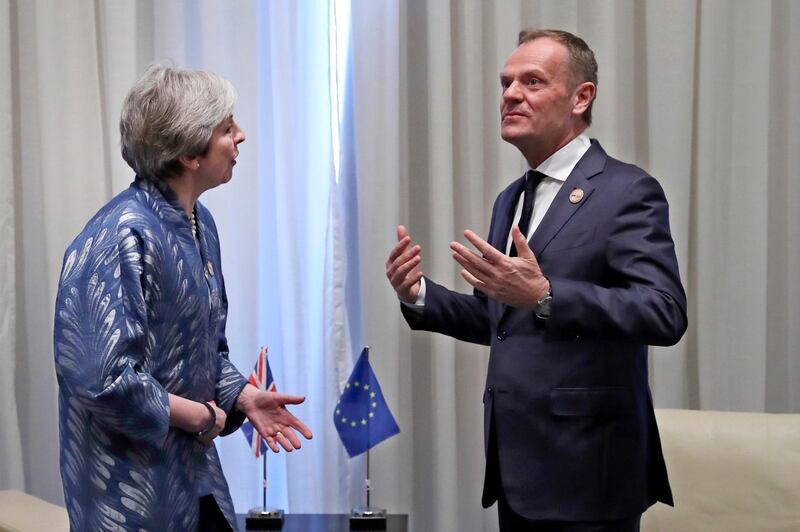British Prime Minister Theresa May again pushed back the deadline for Parliament to vote on her Brexit deal, in a gamble she hopes will buy more time for negotiations but which risks inflaming the revolt against her.
Mrs May said that she would not bring a new exit deal back to the House of Commons for a final vote this week.
Instead, she is asking sceptical members of Parliament to give her more time to renegotiate, promising they will have a vote by March 12 – 17 days before the UK is set to leave the bloc, with or without a deal.
Politicians, including ministers in Mrs May’s Cabinet, are quickly running out of patience as she struggles to renegotiate her deal in Brussels.
Business groups reacted with dismay on Sunday to the latest sign of delay.
Shadow Brexit secretary Sir Keir Starmer said Mrs May was "recklessly running down the clock in a desperate attempt to force MPs to choose between her deal and no deal".
Parliament is looking more likely to force her to delay the March 29 departure date at a showdown in the Commons on Wednesday.
A growing number of politicians are worried that the UK will leave the EU with no deal if the drift is allowed to continue, with catastrophic consequences for the economy.
Ministers said on Friday that they had already agreed to grant Mrs May more time twice and were not prepared to do it again.
Mrs May’s proposed divorce agreement was rejected overwhelmingly in the Commons last month.
She is trying to rewrite the most contentious part of the agreement in relation to the Irish border.
Some of Mrs May’s team think her opponents in the EU and Parliament can be persuaded to support her if she runs down the clock and forces them to look at the prospect of a no-deal exit in March.
Meanwhile, the EU is coming up with its own new tactics.
Officials are considering telling Mrs May that if she cannot get her deal through Parliament, the alternative to a no-deal crash is a long extension.
Three EU officials said the idea of a 21-month extension is being considered, a move pro-Brexit hardliners in the UK will see as an attempt to frighten them into backing Mrs May’s accord.
This decision to further delay the meaningful vote is the height of irresponsibility.
— Keir Starmer (@Keir_Starmer) February 24, 2019
Theresa May is recklessly running down the clock in a desperate attempt to force MPs to choose between her deal and no deal.
Parliament cannot standby and allow this happen. https://t.co/SAxmhnX6I0
Such a long extension could allow anti-Brexit campaigners the chance to reverse the whole divorce.
Mrs May arrived in Egypt braced for what could be the most difficult week of her troubled premiership.
She spoke to European Council President Donald Tusk and is expected to speak to leaders including German Chancellor Angela Merkel at a summit in the Red Sea resort of Sharm El Sheikh.
Mr Tusk told her that he would not call another summit of EU leaders to endorse any changes to the deal until she could prove they would win support in Parliament. That is difficult for Mrs May to deliver.





